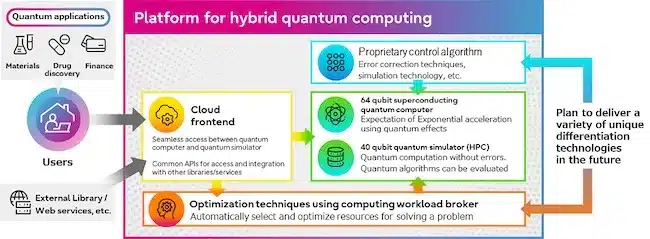A hybrid platform combines the advantages of quantum computers and quantum simulators!
Fujitsu, an information and communication technology provider and Riken, a research institute announced successful development of a 64 qubit superconducting quantum computer along with a platform for hybrid quantum computing.
The computer includes an integrated 64 superconducting qubit chip (a central element for the computing functions of quantum computers). It uses a vertical wiring scheme similar to that of Riken’s quantum computer (Japan’s first), making it scalable for future expansion. It leverages a qubit control software to achieve high-precision control of qubits. Using quantum superposition and entanglement states, it is expected to have compute speeds much higher than classical computers.
The platform for hybrid quantum computing combines the computing power of 64 qubit superconducting quantum computer with 40 qubit quantum computer simulators. Quantum simulators, which can digitally imitate quantum computation, can potentially enable practical fault-tolerant quantum computers (FTQC). Unlike current quantum computers, quantum simulators can perform error-free and long-step (quantum-like) computations as they do not rely on error-prone qubits. But, they cannot realize actual quantum acceleration, an expected benefit of practical quantum computers.

The hybrid platform has a scalable cloud architecture. It enables easy comparison of calculation results of noisy intermediate-scale quantum (NISQ) computers against error-free results from quantum simulators. It is expected to enable flexible switching between quantum computing and quantum simulation. The platform may be linked to external quantum chemistry calculation libraries in the future.
They are also developing an algorithm that links superconducting quantum computing with high-performance computing (HPC) which enables quantum chemistry calculations with greater accuracy than conventional algorithms (Coupled cluster single, double, and triple or CCSD(T)). The algorithm enables the calculation of large molecules with high accuracy using quantum algorithms and density matrix embedding theory (DMET). The algorithm is planned to be included in the hybrid platform.
Fujitsu and RIKEN will further promote the development of technologies including high-density implementation to realize a 1,000 qubit superconducting quantum computer, as well as technologies to achieve more precise quantum gate operations.






